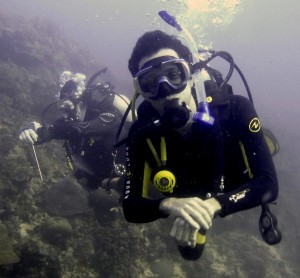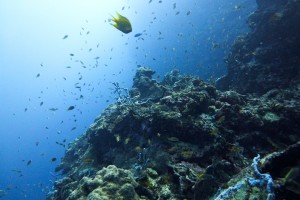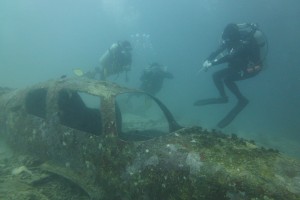Planning Our Dive With a Buddy

Our open water student planning and leading their first dive with Instructor Andy and Divemaster Lukas
The thought of planning a dive with our dive buddy for the first time may be a little scary or even overwhelming at first; but then again was it so different the first time we submerged our heads in the swimming pool or the shallows on the beach with a 2nd stage in our mouths? Let’s start out by remembering one of the cardinal rules of diving: Always dive within our limits and training. This may mean that we plan our first dive to the local swimming pool, or a pond at the golf course; we should of course ask permission first as we aren’t advocating trespassing in full SCUBA gear. You may also find it easier to start you planning by talking with a local dive shop or finding a local dive club to meet up with and ask for either some good local dive spots or maybe even a local orientation dive with someone who has dived the site before. Starting well within our limits and training will reduce stressors during our dive allowing us to focus more on the dive and aquatic life, ultimately leading to a much more enjoyable experience that we will feel comfortable repeating. Some things to take into consideration when deciding on a local dive site may include but not be limited to: current (or the lack of), visibility, water temperature, site accessibility, altitude and proximity to local emergency medical services. For this segment we are going to focus on selecting a site with appropriate current and visibility.
Current and Visibility Considerations
Diving with current or lower visibility can make for a very enjoyable and relaxing drift dive or may be necessary to visit a blue water wreck or Manta cleaning station; however, it may not be appropriate if we are trying to plan a relaxing dive with a buddy. Why don’t we start out with a dive site that is well within our limits, training and experience; somewhere with what we call pool like conditions? However, don’t be fooled into thinking that lakes, reservoirs or ponds won’t have current or visibility concerns. Lakes close to an ocean, bay or river may have tidal swings and often have pretty significant thermoclines; which are layered changes in water temperature and can cause significant turbidity. Reservoirs can obviously experience significant changes in current if they are being drained or filled and may also have significant changes in visibility due to algae blooms or runoff from heavy rains. While still water ponds may seem clear and void of current changes they may be used for irrigation and often can have silt bottoms that can easily be stirred up clouding the water for  hours. These concerns can easily be addressed with a little research online, by reading a book on local dive sites or having a conversation with a fellow diver or professional with experience at the site. When we take these potential issues into consideration while planning our dive we become empowered and can use site condition changes to our advantage and to find times with more ideal conditions or dive profiles that are site and condition appropriate. A good practice for planning our first dives could be if we are uncertain then make sure we ask; whether that be online, in a dive shop or maybe a dive club. Having more information than we need will most likely be much better than not enough. Once we have this information and our first dive under our belts and in our log books we will most likely find it much easier for repetitive dives at this site and may find that in time we become the local expert that others come to for advice…
hours. These concerns can easily be addressed with a little research online, by reading a book on local dive sites or having a conversation with a fellow diver or professional with experience at the site. When we take these potential issues into consideration while planning our dive we become empowered and can use site condition changes to our advantage and to find times with more ideal conditions or dive profiles that are site and condition appropriate. A good practice for planning our first dives could be if we are uncertain then make sure we ask; whether that be online, in a dive shop or maybe a dive club. Having more information than we need will most likely be much better than not enough. Once we have this information and our first dive under our belts and in our log books we will most likely find it much easier for repetitive dives at this site and may find that in time we become the local expert that others come to for advice…
The Next Stride
Check in next week when we will discuss some equipment considerations and recommendations. Please feel free to send us your questions, comments or input about this series or requests for future series.
Please send comments and questions to Andy@QuoVadisResort.com
View the previous post here: I’m a Certified Diver: Now What?

